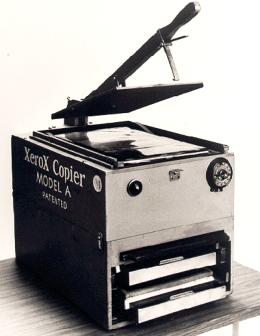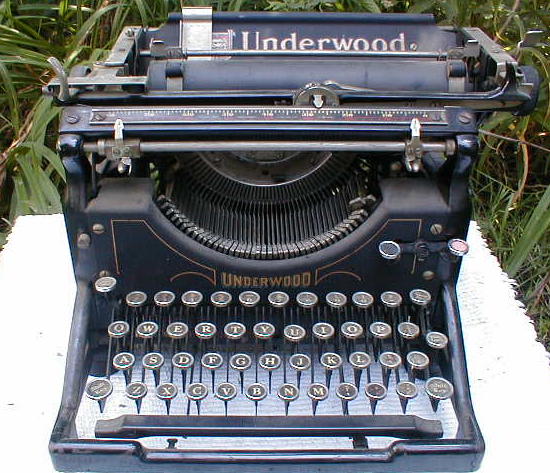Thursday, June 12: Femme Fatale
THE TIMES THEY ARE A CHANGING
by Deborah Elliott-Upton
The cable guy comes to my house today. We’re moving everything over to cable: the TV service, the phone and most importantly to me, the Internet service. I’ve been without Internet for a couple of weeks now and it’s been harder than I imagined. Not having access to my e-mail has been like going into rehab (And I said, No, no, no!)
It’s going to be better in the long run. It’s the short run that’s been killing me.
I was thinking about how much having the World Wide Web has changed our lives. The information highway has opened up a sharing of knowledge as much as the printing press did centuries ago. Imagine the relief of the monks when every manuscript did not have to be copied by hand (also imagine the chance for mistakes—as far as I know there were no white-outs back then either.)
When the national company I worked for finally bought their first Xerox machine, the office manager thought we’d all found Nirvana. The company didn’t buy one of the first and even then didn’t buy one of the new copiers, but we didn’t care. We’d moved up to big time. (This company also was one of the last to discover electric typewriters might speed our work so we could do even more for them. A sales manager once told me the reason management moved so slow for office workers equipment was because we were dead weight while salesman paid the way for everyone else in the company. I didn’t remind him I was in charge of payroll and you should never make a payroll person angry, but I think he may have gotten the message eventually.)
The world doesn’t stop turning and neither does technology. Technology constantly moves forward; it’s impossible for us to “keep up.” It’s like when dial-up was replaced. The sudden speed made us light-headed at how much faster we could find what we needed online, type a quick e-mail instead of composing, then typing a letter and receiving an answer to a question practically immediately.
I think of authors like Ernest Hemingway stabbing typewriter keys and heaven help him if his fingers hit the wrong key. How much more writing could he have accomplished with today’s tools?
In a writer’s organization, I attended a seminar aimed at beginning writers. While the instructor told how to properly format and submit a manuscript, one elderly lady looked puzzled. Timidly, she held up her hand. When the instructor recognized her, the elderly woman asked, “Are you saying I should send in my original copy and only keep the carbon copies?” The room fell silent, then I heard murmurs around me as young writers asked, “What’s a carbon copy?”
At a local bookstore, I paused to listen as a woman read to small children. Nestled at her feet, the children were in rapture until the woman said the word, typewriter. “Do you know what that is?” the reader asked.
One girl piped up, “I saw a picture of one once.”
We’re lucky to have modern miracles. Simultaneously, they make our productivity soar and our lives more hectic, but I know very few who would willingly give up access to the Internet, word processors and our love/hate relationship with e-mail.
One thing we need to remember is to embrace new technology as it becomes available. Those who don’t become lost in a world that is shaded in the past. Sure, I enjoy Nick at Night, but I don’t ignore new programming. I read classics, but also the latest bestsellers. I could use a manual typewriter, but I know how much better today’s modern computer keyboard feels to the touch.
A sergeant told me that this generation does not understand there was a time when the United States Army didn’t include women soldiers clad in combat gear. Prior to the birth of her first child, Jessica Alba said soon all families will be interracial like hers. Most children can’t comprehend televisions can be manually turned on and off.
Watching a 1940’s black and white movie, it was funny seeing the executive’s desk lined with three or four phones. No one had multiple lines on a phone then and a three way conference call was orchestrated by one man listening in on one phone and repeating everything that was said into the second phone. No one had cell phones just a couple of decades ago and if they had one of the first models they looked like bricks and were too expensive for the public masses.
When reading a period piece of writing, nothing will jar a reader from belief faster than someone mentioning a modern product or convenience that did not belong to that period. There were no curly fries in the 1960’s, no Hoola Hoops in the 40’s and no telegrams in the 1600’s.
My husband will be the first to throw up in his hands in anguish when a movie or a book states a type of weapon that was not available during that particular time in history. He notices the guns. “They didn’t even make the Winchester 73 until 1873,” he’ll say in obvious disgust. Or, “I’ve counted eight shots already from that six-shooter. You’d think they’d have a technical guy on that.”
I notice heavy, black eyeliner and big, puffy hair on the beautiful Claudia Cardinale in “The Professionals.” While quite popular on the mid-Sixties fashion pages when the movie was made, these were definitely not styles worn by women in the Old West.
A designer once told me filmmakers take greater pains in costume accuracy, but writers need to be more aware of the clothing in terms of his time period of stories. Indiana Jones can get away with that great hat, but if we’re reading about a man in 2008, if he’s wearing a hat, the writer probably needs to give him a reason for wearing one. (Personally, I love hats for men and women and hope they make a comeback.)
As for me, I’m awaiting the newest in technology to reach my home. With open arms, I am more than ready to travel to faraway places in cyberspace and contact old and new friends and to read wonderfully accurate short stories on webzines and web sites of my favorite authors.
Someone once said, “Time waits for no one.” Still, I’m waiting for the cable guy and hoping his name isn’t Larry.
























I’m all for the return of the hat (proper hats, not baseball caps, or the type of pulldown-floppy that should really only be worn on u-boats).
Claudia has eyeliner? And fluffy hair? (mystified) Did any of you other guys notice?
When the Clinton administration moved into the White House, they were astonished to find typewriters, telex machines, and a manual switchboard. That prompted a major upgrade, which the public heard referred to as the “information superhighway”. The resulting push brought a burst of technology to millions, including the internet, digital photography, GPS units, on-line reference, and world-wide communications.
Monks (and scribes) did have a couple of whiteout options. Organic (non-metalic) inks could be bleached out. Vellum could be scraped and I believe that entire sheets were scraped for reuse. (I suspect James has much more info on this stored in his head.)
Still, the DEL key is handy!
How well I remember the time consuming job of using a typewriter for fiction. I even used mimeograph paper of different colors for second draft, third and so on. Then, as you pointed out, one slip on the final copy and an entire page had to be typed again unless you were willing to submit sloppy work. I imagine some young writers today aren’t even aware of what a draft was in the old days.
I like the Amy Winehouse reference.
Claudia has eyeliner? And hair? (mystified) Did any of you other guys notice?……..
Sure I’ll be reprimanded again, but THIS is not unlike “locker room” talk I was speaking of during Leigh’s article! Not talk about THEIR OWN women, just women in general and not that you were bad mouthing a beautiful woman or anything…..:-)
As for your great article, Deborah, I have a well published friend who still writes her stories out on paper and then transfers to the computer.
Amazing. I love the computer. PCs 🙂 r me.
This is a true story. Gabriel, the newest monk in the medieval Franciscan order was assigned to work in the copy room. Within a few days he noticed that all the monks were making copies from the previous copy they had just completed, not from the original text. With the boldness of the child who pointed out that the emperor had no clothes, Gabriel stated the obvious to the priest in charge of the copy operation. “Father John,” he noted, “by always making copies from copies, wouldn’t a mistake made along the way be perpetuated in all future copies?” “Humbug,” the old man growled back. Apparently he had read Dickens and wasn’t open to fresh ideas from the newest kid to shave his head.
The following morning when all the monks reported to their tables to begin work, sobs could be heard coming from the archives on the floor below them. They all went down the stairs to find the Father John, his eyes filled with tears and his head lying atop the oldest book in the collection. “What’s the matter, Father,” one of copiers asked. “The young brother Gabriel was right,” he said amid heaving sobs of grief, “The original text says celebRate.”
Sure I’ll be reprimanded again, but THIS is not unlike “locker room” talk I was speaking of during Leigh’s article! Not talk about THEIR OWN women, just women in general and not that you were bad mouthing a beautiful woman or anything…..:-)
One of the big differences between men and women is that women can reliably predict the future.
I fail to see how mild innuendo regarding a deliberately provocative movie star is remotely similar to crude locker room gossip regarding women one knows personally.
Women are at least as fond of innuendo as are men. You want a locker room? How about “Sex and the City”? Do you know any men at all who faithfully watched it on HBO? How about guys who were chomping at the bit to see the movie?
No, you don’t.
I rest my case.
I rest my case.
You did realize I was being ironic about women predicting the future, right?
I was being ironic….
be still my heart….surely not! 🙂
And if I’d had a silent (computer) keyboard in the Dorm during my early 1980’s College Days, I might have typed out a novel “after hours” when we wern’t allowed to make a lot of noise! Jack Williamson, the Science Fiction writer I’ve mentioned, who lived to be nearly 100 and died a few years ago and published his first fiction in the 1920’s and his last in the early 2000’s was still attending panels at writer’s conferences whose subject was “What Do Editors Want?” He was an early user of computer-Word Processor technology. (Me? I was a Luddite! Didn’t get online at all until around 1999. And in High
School I told my best friend that “this computer stuff” was junk, because “all you can do is math and play virtual tennis!” He is the computer whiz for a nationally-known company today…)
Children! Knock it off! (Deborah, dear, don’t yank them by their ears.)
From alisa’s viewpoint, she is right: In the heights (or depths) of feminist excesses, my comment would have been not only considered locker room talk, but could have been grounds for firing followed by a harassment suit. That’s not to suggest alisa is a feminist; I know she’s not, only that she was trying to examine that point of view.
From James’ viewpoint, he is right: Men don’t talk about their own women, although we concede that innuendo about other women can, does, and will happen. We might not call it locker room talk, but James and I, being the sensitive souls that we are, can understand how women might interpret it as such. (Mainly it was Leigh being his usual smartass self.)
Without HBO, I have only a vague idea what Sex in the City is about: A London reviewer said you have to have estrogen to enjoy it.
Meanwhile, the best line of the day (above) goes to Tony Harris.
Leigh, you @#$ !& gender traitor.
(laughing)
Count me as one of those @#$!& gender traitors as well, but problem is I’ve been cussed by the other side as well. In the words of Rodney King … Can’t we all just get along?